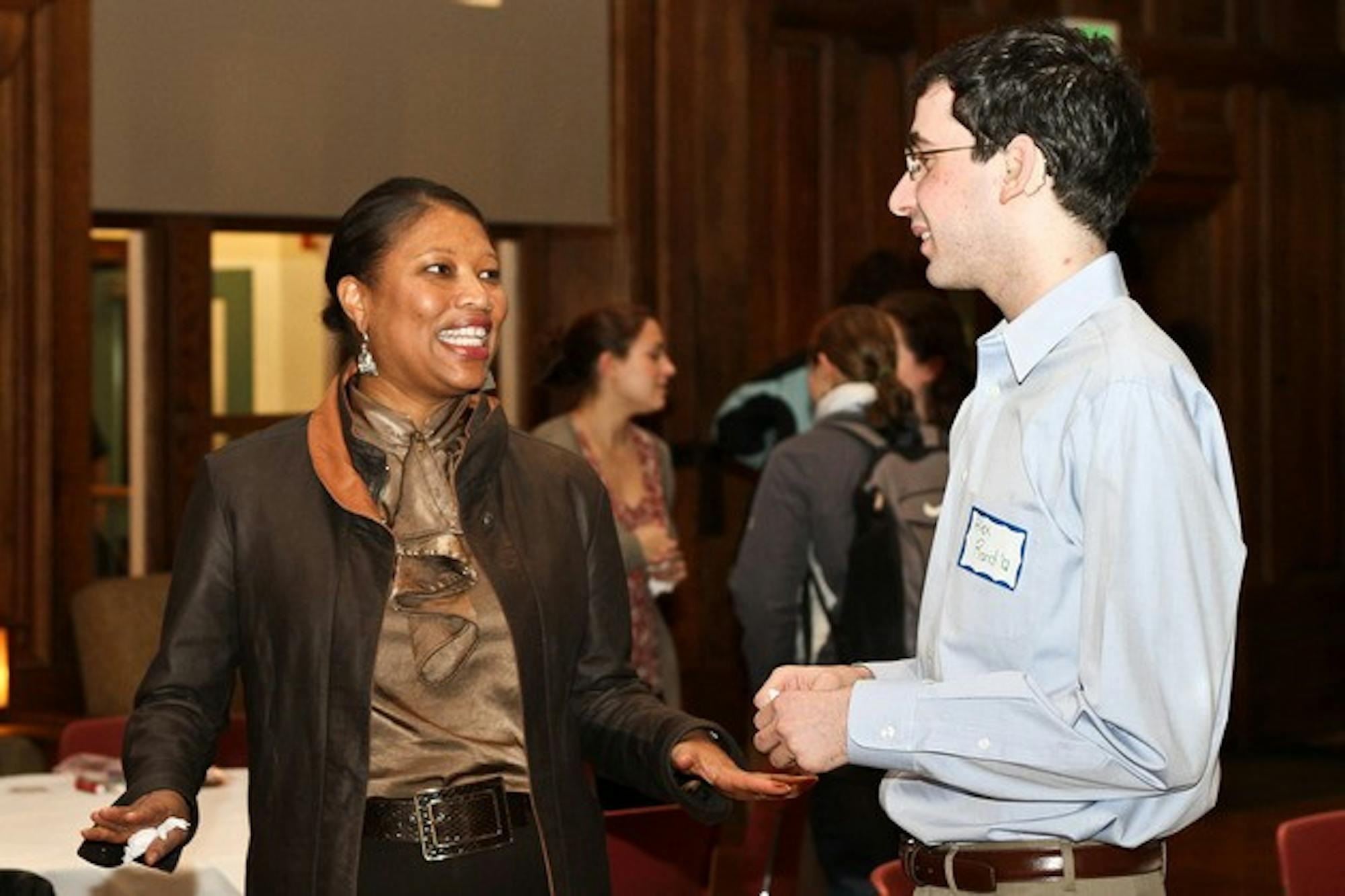Panelists stressed the importance of seeking assistance from the College's various health resources. They also encouraged their fellow students to understand the challenges others may face because of their respective disabilities and health-related issues, some of which may not be immediately visible.
Student Accessibility Services provided assistance to 337 students approximately 8 percent of the Dartmouth student population during the 2010-2011 fiscal year, according to assistant director of Student Accessibility Services Larissa Hopkins, who opened the panel discussion.
Tanisha Panditharatne '13 discussed surviving a car crash during her sophomore summer that almost left her permanently paralyzed. The car in which she was a passenger was racing with another car and crashed into a wall at approximately 100 miles per hour.
"I remember seeing the stone wall and thinking, This is the end,'" she said. "I closed my eyes and felt complete helplessness because there was nothing that I could do in those few seconds that could change what would happen."
Upon realizing after the crash that she could move her limbs, Panditharatne dragged herself out of the car and found that she couldn't support her body, she said. Doctors later determined she had shattered a bone in her spine.
"It was literally millimeters away from paralyzing me from the waist down," she said.
Panditharatne said she spent over 14 weeks recovering in bed before returning to school. She currently wears a brace and is determined to educate others about disability-related issues.
Alex Rand '12, who is hard of hearing and wears a hearing aid, said most people at Dartmouth have been understanding and accommodating. Rand uses closed-captioning services in his classes.
"I was once told that my hearing aids are worth more than me, but now I can say that my education is worth more than them," he said.
Rand also remarked that his hearing difficulties have made navigating the College's social scene challenging.
"Having a heightened sense of smell at a fraternity is not an advantage," he said.
Rand said he plans to pursue a career in medicine and will attend medical school in the fall.
Jennifer McGrew '13 struggled academically during her freshman year before consulting with professionals at the College, who diagnosed her with a reading disability in the winter of her sophomore year, she said. McGrew said she regretted not asking for help earlier.
"It wasn't until I talked to a friend diagnosed with a learning disability in elementary school that I realized that a learning disability wasn't something to be embarrassed about," she said.
McGrew said her family believed she did not have a learning disability but was being stigmatized.
"I had to explain to them that this was not the case that by being diagnosed with a learning disability, the playing field had finally been leveled," she said.
McGrew said that Student Accessibility Services provided her with software that reads her assigned materials out loud to her, a "smart pen" that records her lectures and a note-taker to keep track of her classes. She encouraged others to "utilize your resources" and ask for help in order to deal with disabilities.
Karen '14, who wished to keep her last name anonymous due to the sensitive nature of the discussion, said that growing up with a brother with Asperger's Syndrome has compelled her to address the negative stereotypes associated with disabilities.
She said she was initially embarrassed by her brother, who has difficulty socializing.
"One of the saddest things I saw was that his over-friendly smiles and attempts at small talk only discouraged people from talking to him," she said. "The worst part was that many times, he did not know he was being mocked."
Over time, he has been able to overcome his "awkward personality" and has won national math competitions and chess contests and earned the respect of his peers, she said.
"Because of my brother's disability, I have learned to respect others who may not always feel included," she said.
Last year, Karen '12 was diagnosed with major depressive disorder and anxiety, she said.
She said her family did not react well to her diagnosis and told her not to talk about her health issues with others.
Karen '12 said she witnessed her family's fear of expressing vulnerability at Dartmouth, where students are often more concerned about their reputations than their mental health. In order to distract her from her own problems, Karen '12 became actively involved in extracurricular activities.
"When I was out in the open, I would put on a happy face," she said.
Karen '12 said she hoped the discussion will help promote greater awareness of disabilities in the community.
"It's to make you realize that mental health issues affect everyone in a different way," she said. "The key is not to survive in this environment, but to thrive."
Caroline Godfrey '12, who was diagnosed with Type 1 diabetes the summer following her freshman year, said she experiences a wide range of reactions when people learn that she has the condition. Many people perpetuate common misconceptions of the disease or confuse Type 1 diabetes with Type 2 diabetes, she said.
She is required to take insulin shots about 30 times a week, and miscalculating a dosage could have long-lasting, crippling repercussions. She said she does not want to be defined by the disease and is often frustrated when people try to assume the role of doctor.
"It's a little offensive when people think they have a better idea on how to handle my health than I do," she said.
People are sometimes scared by the casual demeanor she adopts when discussing the disease, she said.
"I know that looking me, I don't look sick," she said. "Disabilities are not always visible, and it's both a blessing and a curse to have an invisible illness. Unless you have walked in my shoes, you can't understand the larger context."
The event was sponsored by Access by Leadership in Equity, a student organization devoted to raising awareness about disability-related issues.




